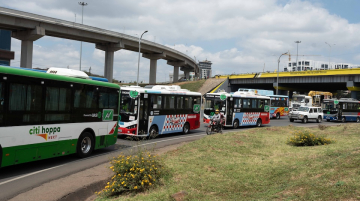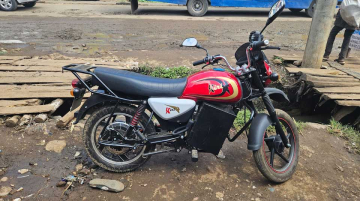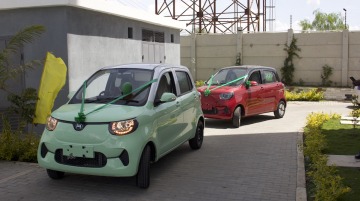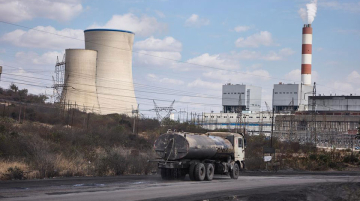
Chinese car brands are steadily making their way into the African market, but it’s still early in the process, so it will take several years, at least, for these companies to build a sizable customer base. Meanwhile, these brands’ advancements in electric vehicle (EV) technology are jump-starting innovation across the mobility sector in Africa, spurred by the global push to transition from internal combustion engine (ICE) vehicles to renewable energy alternatives.
In Kenya, purchasing a new Chinese EV remains out of reach for many. Nonetheless, innovative entrepreneurs are developing solutions to help bridge the gap and enable the transition from costly ICE vehicles. Over the past six years, Joe Gakuru, an electrical engineer, has transformed Qtron Industries from a small e-waste recycling firm into a leader in sustainable mobility and energy solutions. Many of the vehicles he works on incorporate Chinese EV components, particularly batteries.
Qtron Industries specializes in repairing and manufacturing batteries and retrofitting ICE vehicles and motorbikes into EVs, showcasing a practical approach to advancing e-mobility in the region.
Necessity Ignites Passion
Growing up in a village without electricity, Gakuru developed an early fascination with power.
“Electricity was quite a hassle back then,” he recalls. “A friend’s car battery became our makeshift power source.” They would carry the battery to a charging station and use it to power a TV at home. This practical yet innovative solution sparked Gakuru’s curiosity and inspired him to experiment with batteries, bulbs, and motors.
His early hands-on tinkering with electronics laid the groundwork for his expertise today. Self-taught in reverse engineering, Gakuru combined his technical skills with a passion for green energy and innovation, charting a path into the electric vehicle (EV) and energy storage industries.
The Role of Chinese Technology
China’s dominance in EV technology has been a cornerstone of Gakuru’s operations. His company sources essential components, such as batteries, high-voltage connectors, and fuses, from top manufacturers like BYD.
“China is the largest supplier of EV components, even for global manufacturers,” he explains. “The affordability and availability of Chinese technology make it essential for retrofitting projects in Kenya.”
However, Qtron’s work is not solely dependent on Chinese imports. Gakuru’s team also incorporates technologies from U.S. and European manufacturers, as well as innovations developed locally. For example, they have created custom software to optimize vehicle performance, adding features like gear engagement and air conditioning. This fusion of global and local innovation ensures their retrofitted vehicles cater to diverse customer needs and preferences.
Retrofitting: A Cost-Saving Solution for Classics Cars
Gakuru’s clientele primarily consists of classic car enthusiasts who wish to modernize their vehicles known for their rigidity and durability. He explains that his customers often prefer converting these classics into EVs rather than purchasing new electric models.
One of his most expensive projects involved retrofitting a Volkswagen van for $40,000. The client wanted premium features, including a Tesla motor, heated seats, air conditioning, and fast charging capabilities.
Gakuru’s clientele is primarily classic car enthusiasts who want to modernize their vehicles, which are known for their rigidity and durability. Instead of buying new electric models, many prefer to modernize their beloved classics by converting them into EVs.

One of his most ambitious and costly projects was retrofitting a Volkswagen van for $40,000. The client requested premium features such as a Tesla motor, heated seats, air conditioning, and fast-charging capabilities, transforming the vintage vehicle into a state-of-the-art electric model.
Retrofitting offers a more cost-effective solution than importing a new EV, which can be prohibitively expensive due to high import duties that often double the vehicle’s price. By converting existing vehicles into EVs, retrofitting not only provides an affordable alternative but also extends the lifespan of cherished cars.
Tackling E-Waste Dumping and Promoting Sustainability in Africa
Africa has long grappled with the challenge of e-waste dumping, where outdated or end-of-life technology products are shipped from developed nations to the continent. In response, Gakuru’s company has transformed this issue into an opportunity by repairing and repurposing batteries from hybrid and electric vehicles (EVs).
The team also recycles lithium and nickel-cadmium batteries, partnering with local firms to ensure sustainable disposal and reuse. This approach not only reduces waste but also supports Kenya’s transition to renewable energy solutions.
Repairing and Retrofitting Challenges
Gakuru’s workshop has become a hub for EV repairs, especially motorbikes, which are rapidly gaining popularity in Kenya. The most common issues involve batteries, often damaged by flooding or improper use. To date, his team has repaired over 2,000 batteries, replacing cells and battery management systems (BMS) to restore functionality.
For EV vehicles, repairs frequently involve charging ports, motors, and infotainment systems. Gakuru’s team also customizes imported Chinese EVs by converting their software from Chinese to English, making them more user-friendly for local customers.

Building New Batteries and Energy Solutions
At Qtron, Gakuru’s team designs and builds custom batteries for scooters, e-bikes, and solar energy storage systems. By replacing lead-acid batteries with advanced lithium phosphate alternatives, the company delivers products with improved performance, longer lifespans, and reduced weight.
“We provide a two-year warranty on our retrofitted batteries, and they’re designed to last seven to ten years,” Gakuru says.
Repurposed EV batteries are another key focus. Batteries no longer suitable for vehicles are converted into energy storage solutions for homes and businesses. One of Gakuru’s largest projects involved creating a 150-kilowatt energy storage system for a hotel, cutting battery costs by 60% compared to new ones.
Driving the Future of Mobility
Gakuru seeks to make sustainable mobility and energy accessible in Kenya. By blending imported technology with local innovation, he’s creating affordable solutions that reduce waste and promote renewable energy. His company is helping to redefine Kenya’s nascent e-transportation, creating a platform for ingenious innovations to enhance Kenya’s renewable energy landscape.
Gakuru seeks to make sustainable mobility and energy accessible in Kenya. By integrating imported technologies with local innovations, his company develops affordable, waste-reducing solutions that promote renewable energy. Through his efforts, Qtron is redefining Kenya’s emerging e-transportation sector and creating a platform for transformative innovations to enhance the country’s renewable energy landscape.









